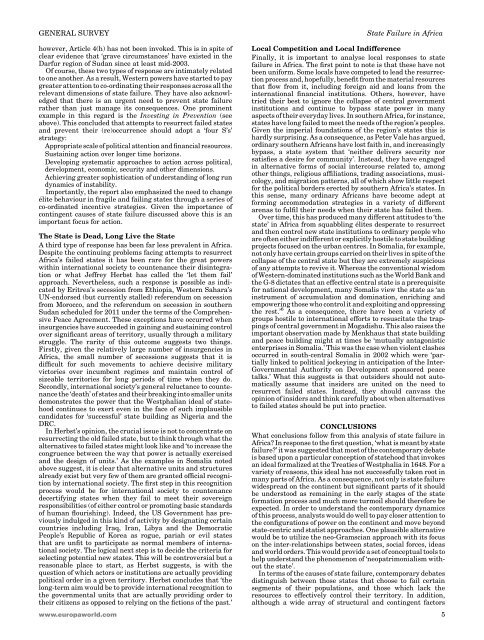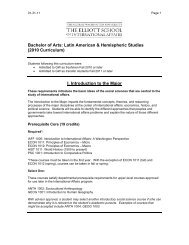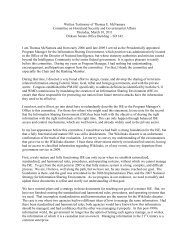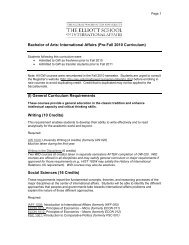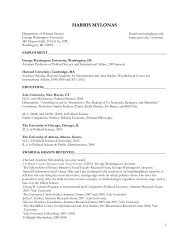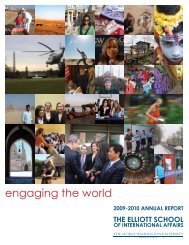state failure in africa: causes, consequences and responses
state failure in africa: causes, consequences and responses
state failure in africa: causes, consequences and responses
You also want an ePaper? Increase the reach of your titles
YUMPU automatically turns print PDFs into web optimized ePapers that Google loves.
GENERAL SURVEY State Failure <strong>in</strong> Africa<br />
however, Article 4(h) has not been <strong>in</strong>voked. This is <strong>in</strong> spite of<br />
clear evidence that ‘grave circumstances’ have existed <strong>in</strong> the<br />
Darfur region of Sudan s<strong>in</strong>ce at least mid-2003.<br />
Of course, these two types of response are <strong>in</strong>timately related<br />
to one another. As a result, Western powers have started to pay<br />
greater attention to co-ord<strong>in</strong>at<strong>in</strong>g their <strong>responses</strong> across all the<br />
relevant dimensions of <strong>state</strong> <strong>failure</strong>. They have also acknowledged<br />
that there is an urgent need to prevent <strong>state</strong> <strong>failure</strong><br />
rather than just manage its <strong>consequences</strong>. One prom<strong>in</strong>ent<br />
example <strong>in</strong> this regard is the Invest<strong>in</strong>g <strong>in</strong> Prevention (see<br />
above). This concluded that attempts to resurrect failed <strong>state</strong>s<br />
<strong>and</strong> prevent their (re)occurrence should adopt a ‘four S’s’<br />
strategy:<br />
Appropriate scale of political attention <strong>and</strong> f<strong>in</strong>ancial resources.<br />
Susta<strong>in</strong><strong>in</strong>g action over longer time horizons.<br />
Develop<strong>in</strong>g systematic approaches to action across political,<br />
development, economic, security <strong>and</strong> other dimensions.<br />
Achiev<strong>in</strong>g greater sophistication of underst<strong>and</strong><strong>in</strong>g of long run<br />
dynamics of <strong>in</strong>stability.<br />
Importantly, the report also emphasized the need to change<br />
élite behaviour <strong>in</strong> fragile <strong>and</strong> fail<strong>in</strong>g <strong>state</strong>s through a series of<br />
co-ord<strong>in</strong>ated <strong>in</strong>centive strategies. Given the importance of<br />
cont<strong>in</strong>gent <strong>causes</strong> of <strong>state</strong> <strong>failure</strong> discussed above this is an<br />
important focus for action.<br />
The State is Dead, Long Live the State<br />
A third type of response has been far less prevalent <strong>in</strong> Africa.<br />
Despite the cont<strong>in</strong>u<strong>in</strong>g problems fac<strong>in</strong>g attempts to resurrect<br />
Africa’s failed <strong>state</strong>s it has been rare for the great powers<br />
with<strong>in</strong> <strong>in</strong>ternational society to countenance their dis<strong>in</strong>tegration<br />
or what Jeffrey Herbst has called the ‘let them fail’<br />
approach. Nevertheless, such a response is possible as <strong>in</strong>dicated<br />
by Eritrea’s secession from Ethiopia, Western Sahara’s<br />
UN-endorsed (but currently stalled) referendum on secession<br />
from Morocco, <strong>and</strong> the referendum on secession <strong>in</strong> southern<br />
Sudan scheduled for 2011 under the terms of the Comprehensive<br />
Peace Agreement. These exceptions have occurred when<br />
<strong>in</strong>surgencies have succeeded <strong>in</strong> ga<strong>in</strong><strong>in</strong>g <strong>and</strong> susta<strong>in</strong><strong>in</strong>g control<br />
over significant areas of territory, usually through a military<br />
struggle. The rarity of this outcome suggests two th<strong>in</strong>gs.<br />
Firstly, given the relatively large number of <strong>in</strong>surgencies <strong>in</strong><br />
Africa, the small number of secessions suggests that it is<br />
difficult for such movements to achieve decisive military<br />
victories over <strong>in</strong>cumbent regimes <strong>and</strong> ma<strong>in</strong>ta<strong>in</strong> control of<br />
sizeable territories for long periods of time when they do.<br />
Secondly, <strong>in</strong>ternational society’s general reluctance to countenance<br />
the ‘death’ of <strong>state</strong>s <strong>and</strong> their break<strong>in</strong>g <strong>in</strong>to smaller units<br />
demonstrates the power that the Westphalian ideal of <strong>state</strong>hood<br />
cont<strong>in</strong>ues to exert even <strong>in</strong> the face of such implausible<br />
c<strong>and</strong>idates for ‘successful’ <strong>state</strong> build<strong>in</strong>g as Nigeria <strong>and</strong> the<br />
DRC.<br />
In Herbst’s op<strong>in</strong>ion, the crucial issue is not to concentrate on<br />
resurrect<strong>in</strong>g the old failed <strong>state</strong>, but to th<strong>in</strong>k through what the<br />
alternatives to failed <strong>state</strong>s might look like <strong>and</strong> ‘to <strong>in</strong>crease the<br />
congruence between the way that power is actually exercised<br />
<strong>and</strong> the design of units.’ As the examples <strong>in</strong> Somalia noted<br />
above suggest, it is clear that alternative units <strong>and</strong> structures<br />
already exist but very few of them are granted official recognition<br />
by <strong>in</strong>ternational society. The first step <strong>in</strong> this recognition<br />
process would be for <strong>in</strong>ternational society to countenance<br />
decertify<strong>in</strong>g <strong>state</strong>s when they fail to meet their sovereign<br />
responsibilities (of either control or promot<strong>in</strong>g basic st<strong>and</strong>ards<br />
of human flourish<strong>in</strong>g). Indeed, the US Government has previously<br />
<strong>in</strong>dulged <strong>in</strong> this k<strong>in</strong>d of activity by designat<strong>in</strong>g certa<strong>in</strong><br />
countries <strong>in</strong>clud<strong>in</strong>g Iraq, Iran, Libya <strong>and</strong> the Democratic<br />
People’s Republic of Korea as rogue, pariah or evil <strong>state</strong>s<br />
that are unfit to participate as normal members of <strong>in</strong>ternational<br />
society. The logical next step is to decide the criteria for<br />
select<strong>in</strong>g potential new <strong>state</strong>s. This will be controversial but a<br />
reasonable place to start, as Herbst suggests, is with the<br />
question of which actors or <strong>in</strong>stitutions are actually provid<strong>in</strong>g<br />
political order <strong>in</strong> a given territory. Herbst concludes that ‘the<br />
long-term aim would be to provide <strong>in</strong>ternational recognition to<br />
the governmental units that are actually provid<strong>in</strong>g order to<br />
their citizens as opposed to rely<strong>in</strong>g on the fictions of the past.’<br />
Local Competition <strong>and</strong> Local Indifference<br />
F<strong>in</strong>ally, it is important to analyse local <strong>responses</strong> to <strong>state</strong><br />
<strong>failure</strong> <strong>in</strong> Africa. The first po<strong>in</strong>t to note is that these have not<br />
been uniform. Some locals have competed to lead the resurrection<br />
process <strong>and</strong>, hopefully, benefit from the material resources<br />
that flow from it, <strong>in</strong>clud<strong>in</strong>g foreign aid <strong>and</strong> loans from the<br />
<strong>in</strong>ternational f<strong>in</strong>ancial <strong>in</strong>stitutions. Others, however, have<br />
tried their best to ignore the collapse of central government<br />
<strong>in</strong>stitutions <strong>and</strong> cont<strong>in</strong>ue to bypass <strong>state</strong> power <strong>in</strong> many<br />
aspects of their everyday lives. In southern Africa, for <strong>in</strong>stance,<br />
<strong>state</strong>s have long failed to meet the needs of the region’s peoples.<br />
Given the imperial foundations of the region’s <strong>state</strong>s this is<br />
hardly surpris<strong>in</strong>g. As a consequence, as Peter Vale has argued,<br />
ord<strong>in</strong>ary southern Africans have lost faith <strong>in</strong>, <strong>and</strong> <strong>in</strong>creas<strong>in</strong>gly<br />
bypass, a <strong>state</strong> system that ‘neither delivers security nor<br />
satisfies a desire for community’. Instead, they have engaged<br />
<strong>in</strong> alternative forms of social <strong>in</strong>tercourse related to, among<br />
other th<strong>in</strong>gs, religious affiliations, trad<strong>in</strong>g associations, musicology,<br />
<strong>and</strong> migration patterns, all of which show little respect<br />
for the political borders erected by southern Africa’s <strong>state</strong>s. In<br />
this sense, many ord<strong>in</strong>ary Africans have become adept at<br />
form<strong>in</strong>g accommodation strategies <strong>in</strong> a variety of different<br />
arenas to fulfil their needs when their <strong>state</strong> has failed them.<br />
Over time, this has produced many different attitudes to ‘the<br />
<strong>state</strong>’ <strong>in</strong> Africa from squabbl<strong>in</strong>g élites desperate to resurrect<br />
<strong>and</strong> then control new <strong>state</strong> <strong>in</strong>stitutions to ord<strong>in</strong>ary people who<br />
are often either <strong>in</strong>different or explicitly hostile to <strong>state</strong> build<strong>in</strong>g<br />
projects focused on the urban centres. In Somalia, for example,<br />
not only have certa<strong>in</strong> groups carried on their lives <strong>in</strong> spite of the<br />
collapse of the central <strong>state</strong> but they are extremely suspicious<br />
of any attempts to revive it. Whereas the conventional wisdom<br />
of Western-dom<strong>in</strong>ated <strong>in</strong>stitutions such as the World Bank <strong>and</strong><br />
the G-8 dictates that an effective central <strong>state</strong> is a prerequisite<br />
for national development, many Somalis view the <strong>state</strong> as ‘an<br />
<strong>in</strong>strument of accumulation <strong>and</strong> dom<strong>in</strong>ation, enrich<strong>in</strong>g <strong>and</strong><br />
empower<strong>in</strong>g those who control it <strong>and</strong> exploit<strong>in</strong>g <strong>and</strong> oppress<strong>in</strong>g<br />
the rest.’ 6 As a consequence, there have been a variety of<br />
groups hostile to <strong>in</strong>ternational efforts to resuscitate the trapp<strong>in</strong>gs<br />
of central government <strong>in</strong> Mogadishu. This also raises the<br />
important observation made by Menkhaus that <strong>state</strong> build<strong>in</strong>g<br />
<strong>and</strong> peace build<strong>in</strong>g might at times be ‘mutually antagonistic<br />
enterprises <strong>in</strong> Somalia.’ This was the case when violent clashes<br />
occurred <strong>in</strong> south-central Somalia <strong>in</strong> 2002 which were ‘partially<br />
l<strong>in</strong>ked to political jockey<strong>in</strong>g <strong>in</strong> anticipation of the Inter-<br />
Governmental Authority on Development sponsored peace<br />
talks.’ What this suggests is that outsiders should not automatically<br />
assume that <strong>in</strong>siders are united on the need to<br />
resurrect failed <strong>state</strong>s. Instead, they should canvass the<br />
op<strong>in</strong>ion of <strong>in</strong>siders <strong>and</strong> th<strong>in</strong>k carefully about when alternatives<br />
to failed <strong>state</strong>s should be put <strong>in</strong>to practice.<br />
CONCLUSIONS<br />
What conclusions follow from this analysis of <strong>state</strong> <strong>failure</strong> <strong>in</strong><br />
Africa? In response to the first question, ‘what is meant by <strong>state</strong><br />
<strong>failure</strong>?’ it was suggested that most of the contemporary debate<br />
is based upon a particular conception of <strong>state</strong>hood that <strong>in</strong>vokes<br />
an ideal formalized at the Treaties of Westphalia <strong>in</strong> 1648. For a<br />
variety of reasons, this ideal has not successfully taken root <strong>in</strong><br />
many parts of Africa. As a consequence, not only is <strong>state</strong> <strong>failure</strong><br />
widespread on the cont<strong>in</strong>ent but significant parts of it should<br />
be understood as rema<strong>in</strong><strong>in</strong>g <strong>in</strong> the early stages of the <strong>state</strong><br />
formation process <strong>and</strong> much more turmoil should therefore be<br />
expected. In order to underst<strong>and</strong> the contemporary dynamics<br />
of this process, analysts would do well to pay closer attention to<br />
the configurations of power on the cont<strong>in</strong>ent <strong>and</strong> move beyond<br />
<strong>state</strong>-centric <strong>and</strong> statist approaches. One plausible alternative<br />
would be to utilize the neo-Gramscian approach with its focus<br />
on the <strong>in</strong>ter-relationships between <strong>state</strong>s, social forces, ideas<br />
<strong>and</strong> world orders. This would provide a set of conceptual tools to<br />
help underst<strong>and</strong> the phenomenon of ‘neopatrimonialism without<br />
the <strong>state</strong>’.<br />
In terms of the <strong>causes</strong> of <strong>state</strong> <strong>failure</strong>, contemporary debates<br />
dist<strong>in</strong>guish between those <strong>state</strong>s that choose to fail certa<strong>in</strong><br />
segments of their populations, <strong>and</strong> those which lack the<br />
resources to effectively control their territory. In addition,<br />
although a wide array of structural <strong>and</strong> cont<strong>in</strong>gent factors<br />
www.europaworld.com 5


